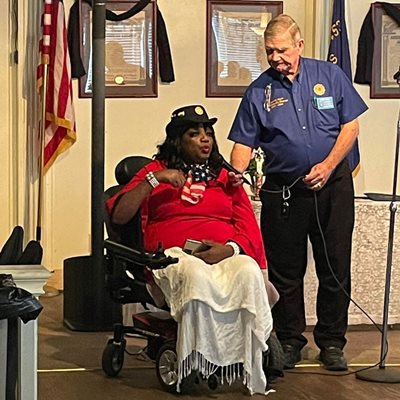For 30 years, Candace Wicks kept up with a demanding routine as an early childhood teacher in Dallas. “At 6 o’clock in the morning, I would jump up, and say, ‘Let’s go!’” recalled Wicks with a laugh.
 It wasn’t just her job for Dallas Independent School District that kept Wicks busy. She also was committed to advocacy throughout the Dallas community. In addition to supporting veterans as a member of American Legion Auxiliary Unit 453, Wicks served in various roles for many organizations, including the American Federation of Teachers, the Martin Luther King Community Center, and New Hope Baptist Church.
It wasn’t just her job for Dallas Independent School District that kept Wicks busy. She also was committed to advocacy throughout the Dallas community. In addition to supporting veterans as a member of American Legion Auxiliary Unit 453, Wicks served in various roles for many organizations, including the American Federation of Teachers, the Martin Luther King Community Center, and New Hope Baptist Church.
Wicks said she modeled herself after her adoptive parents, Samuel and Lela Wicks, who taught her the importance of community service through their own involvement.
And when both of her parents’ health deteriorated because of dementia, Wicks stepped into the role of caretaker for years until they passed in 2012 and 2013.
Wicks showed no signs of slowing down with her community activities until 2020, during the height of the COVID-19 pandemic. That’s when Wicks suffered excruciating abdominal pain and was rushed to the hospital. After undergoing eight surgeries within one month for a cyst, Wicks suffered from life-threatening sepsis complications that required emergency measures. She also was diagnosed with pneumonia and was placed on dialysis. While Wicks survived, she underwent several amputations due to the side effects of her treatment.
Wicks shared with ALA National Headquarters about that life-changing experience and why it didn’t stop her from continuing her lifelong dedication of service.
How did you cope after your devastating medical emergency?
It is like experiencing a death to see your feet one moment, only to wake up and see you have no feet after surgery. You have to fight depression and anxiety. Being raised in a Christian household was my saving grace. My prayer life kept me going. I drew all of my strength from everything my parents taught me. I also received a lot of encouragement and prayers from the hospital chaplains, my family, and my friends.
Most people would understand if you decided to pare down volunteering. Why did you continue?
I was in the hospital for two months, completely bedridden. I couldn’t feed or dress myself. I could barely speak because I had a tube down my throat for so long. I had a discussion with God and He said, ‘If I let you get up off this bed, you have to do what you were doing prior to getting in this condition.’ I made a promise that I would. That was part of my recovery process. The prognosis was that I may be in long-term care. But that wasn’t the case. I had been doing volunteer work since I was 5 years old. It’s kind of ingrained in me.
How do you spend your time now?
I regularly advocate for the needs of the homeless, disabled people, and people who are just down on their luck, which, in most cases, includes veterans. I’m also an avid believer in sending letters and making phone calls to the powers that be — from the local level all the way up to the president. I called the White House recently expressing my concern about the military not being paid if the debt ceiling is not increased.
Why did you join ALA?
My father was a veteran and, upon his death, I wanted to find a way to honor him. He was a private first class in the U.S. Army during the Korean War. I have served as a parliamentarian and chaplain for a previous unit. When I transferred to Unit 453, my responsibilities included Division 1 parliamentarian. I currently serve as the Division 1 historian, and I’m also on the Department of Texas Education Committee.
What would you say to people who are on the fence about volunteering?
There is a blessing in giving and sharing. Everybody’s level of volunteerism may not be the same. Your gifts and talents may be different from your neighbor, but everybody has something they can give. My post has been very accommodating to me. I’m not able to fold 100 boxes of whatever, but I can show my support by buying decorations or donating food. Support comes in different ways, and everybody needs to find out what their niche is and serve that way.
What other message would you like to share?
I’m disabled, but I have a roof over my head. I have clothes on my back. I have food in my pantry. What can I do? I can donate. I can bring awareness to different causes. I can be an encouragement to someone. There are so many different ways people can help. Our deficits don’t make us weak. They make us strong. Don’t push your disabled members aside. It’s not that we cannot do anything. It’s just that we may have to do some things differently. We have to learn how to work together.
In the spirit of Service, Not Self, the mission of the American Legion Auxiliary is to support The American Legion and to honor the sacrifice of those who serve by enhancing the lives of our veterans, military, and their families, both at home and abroad. For God and Country, we advocate for veterans, educate our citizens, mentor youth, and promote patriotism, good citizenship, peace and security.